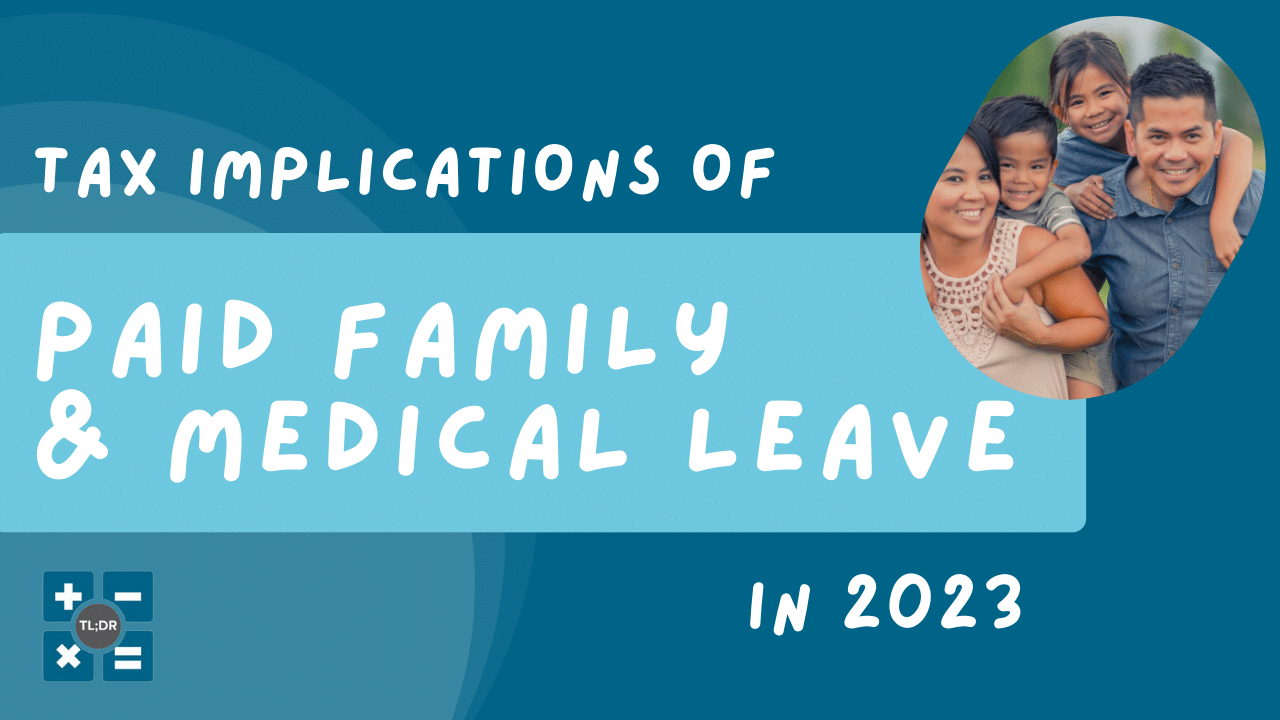Life is full of unexpected twists and turns, and when personal or family matters arise, it’s essential to have the support we need.
Missing work due to health reasons or having to look after your family shouldn’t cost employers and employees both time AND money – which is where Paid Family and Medical Leave (PFML) comes into play! PFML is a crucial benefit that provides employees the necessary time off to care for themselves or their loved ones during challenging times.
As an employer or an employee, it’s important to understand the financial implications of PFML and whether it is considered taxable income.
Sounds like a fun topic, right? Let’s dive in and attempt to shed light on whether PFML is taxable and what the current guidance provided by the Internal Revenue Service (IRS) is.
After all, we’re here to make your life easier!
Understanding PFML
Paid Family and Medical Leave (PFML) is a program that provides employees with the opportunity to take time off from work while still receiving a portion of their wages.
In short, it serves as an important safety net in times of need or significant life events such as childbirth, severe health conditions, or caring for a family member in need.
While PFML programs vary by jurisdiction, we must consider the potential tax implications associated with this benefit.
Understanding the IRS guidelines and considering jurisdiction-specific nuances is crucial for both employers and employees to make informed decisions about the financial impact of PFML.
Tax Treatment of PFML Contributions
Both employers and employees contribute to PFML programs, but the specific details may vary depending on the jurisdiction, which is what makes this process somewhat more tricky.
Generally, PFML contributions are made through payroll deductions, with employers deducting a portion from employees’ wages whilst also contributing their share.
While PFML programs have gained traction across various states and jurisdictions, the IRS has not provided explicit guidance on the taxability of these contributions. Unfortunately, this lack of clarity creates uncertainty regarding PFML contributions for employers and employees, which leaves room for potential tax implications associated with PFML contributions, such as:
- Employer Tax Implications: The deductibility of PFML contributions as business expenses remains uncertain.
- Employee Tax Implications: Without explicit IRS guidance, the impact on taxable income from employee contributions is unclear.
- State-specific Considerations: Each jurisdiction may have unique tax treatment for PFML contributions.
To alleviate your risk of running into any legal troubles when it comes to PFML and navigate tax implications effectively, you can consult tax professionals and relevant authorities. It’s what we do best!
Taxability of PFML Benefits
Now that we’ve discussed the drawbacks of the unclear IRS guidelines, let’s look into some potential taxability and exclusions surrounding PFML.
PFML benefits have parallels to other benefits, such as the Family and Medical Leave Act (FMLA) and disability benefits; however, these benefits are also taxed differently.
General Welfare
The general welfare exclusion allows certain government payments to be excluded from income. These payments must be from a government fund, promote the general welfare, and not be compensation for services.
But since PFML payments are not means-tested and may replace income, this exclusion is unlikely to apply.
Disability Benefits
If PFML is taken for one’s own serious health condition, it could potentially be taxed like a disability benefit. The exclusion under IRC Section 104 applies to post-tax contributions, but not if the employer funds the benefit or if the leave is due to someone else’s injury or sickness.
The taxation of PFML under IRC Section 104 can be complex, especially with mixed employer and employee contributions.
FMLA leave
FMLA is generally unpaid and, therefore, not subject to income tax. As the PFML is a paid benefit, it will act differently from the general Family and Medical Leave Act.
The situation surrounding the specific PFML benefits and how they relate to these other guidelines may impact the tax situation.
If this all sounds confusing and complicated, that’s because it is. It’s also why we recommend seeking professional help that can simplify your situation.
State Level Jurisdictions
The taxability of PFML benefits may also vary at the state level. Each state with a PFML program may have its own tax rules and regulations, which could affect the tax treatment of these benefits.
For example, some states may deem PFML benefits as taxable income, while others may exempt them from taxation.
Employees must be aware of the specific tax guidelines in their state of residence to assess the potential tax implications of PFML benefits properly.
Steps for Employers and Employees
So far, we’ve explored the situation surrounding PFML and its taxability, but in the end, the answer remains unclear due to its no “one size fits all” nature.
So what can Employers and Employees do to understand better and protect themselves?
1. Seek Professional Tax Advice
Seeking professional tax advice is essential due to the complex and evolving nature of PFML tax regulations. Professionals can provide tailored insights, ensuring compliance and maximizing tax benefits whilst preventing you from getting into any unnecessary legal mishaps.
2. Maintain Records and Report
Proper record-keeping is crucial for both employers and employees. Do you want to protect yourself? Ensure you maintain accurate records of PFML contributions, benefit payments, and relevant documentation for reporting and potential audits.
3. Communicate Tax Implications
Proper record-keeping is crucial for both employers and employees. Do you want to protect yourself? Ensure you maintain accurate records of PFML contributions, benefit payments, and relevant documentation for reporting and potential audits.
Final Thoughts
Clear guidance from the IRS regarding the tax treatment of PFML is very much needed.
Employers and employees eagerly await updated guidelines to ensure compliance and make informed decisions.
In the meantime, staying informed about the latest developments is vital to navigate the evolving tax landscape.
Seek guidance from tax professionals like TL;DR Accounting, who can provide personalized advice based on specific circumstances. By staying informed and consulting experts, employers and employees can proactively address their tax obligations and make well-informed decisions regarding PFML.
If you wish to get up to date with your PFML tax obligations, book a call with us today, and we’ll get to the bottom of it!






